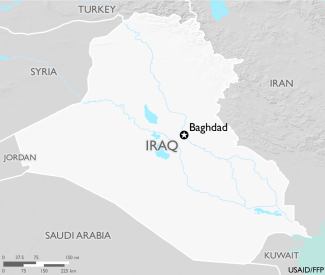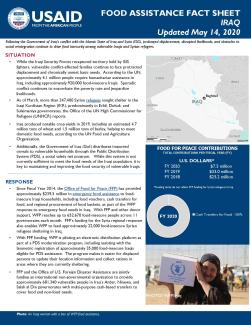May 14, 2020
Following the Government of Iraq’s conflict with the Islamic State of Iraq and Syria (ISIS), prolonged displacement, disrupted livelihoods, and obstacles to social reintegration continue to drive food insecurity among vulnerable Iraqis and Syrian refugees.
Situation
- While the Iraqi Security Forces recaptured territory held by ISIS fighters, vulnerable conflict-affected families continue to face protracted displacement and chronically unmet basic needs. According to the UN, approximately 4.1 million people require humanitarian assistance in Iraq, including approximately 920,000 food-insecure Iraqis. Sporadic conflict continues to exacerbate the poverty rate and jeopardize livelihoods.
- As of March, more than 247,400 Syrian refugees sought shelter in the Iraqi Kurdistan Region (IKR), predominantly in Erbil, Dohuk, and Sulaimaniya governorates, the Office of the UN High Commissioner for Refugees (UNHCR) reports.
- Iraq produced notable crop yields in 2019, including an estimated 4.7 million tons of wheat and 1.5 million tons of barley, helping to meet domestic food needs, according to the UN Food and Agriculture Organization.
- Additionally, the Government of Iraq (GoI) distributes imported cereals to vulnerable households through the Public Distribution System (PDS), a social safety net program. While this system is not currently sufficient to meet the food needs of the Iraqi population, it is key to maintaining and improving the food security of vulnerable Iraqis.
Response
- Since Fiscal Year 2014, the Office of Food for Peace (FFP) has provided approximately $239.5 million in emergency food assistance to food-insecure Iraqi households, including food vouchers, cash transfers for food, and regional procurement of food baskets, as part of the WFP response to emergency food needs in Iraq. With FFP and other donor support, WFP reaches up to 652,670 food-insecure people across 11 governorates each month. FFP’s funding for the Syria regional response also enables WFP to feed approximately 22,000 food-insecure Syrian refugees sheltering in Iraq.
- With FFP funding, WFP is piloting an electronic distribution platform as part of a PDS modernization program, including assisting with the biometric registration of approximately 35,000 food-insecure Iraqis eligible for PDS assistance. The program makes it easier for displaced persons to update their location information and collect rations in areas where they are currently sheltering.
- FFP and the Office of U.S. Foreign Disaster Assistance are jointly funding an international non-governmental organization to provide approximately 681,340 vulnerable people in Iraq’s Anbar, Ninewa, and Salah al Din governorates with multi-purpose cash-based transfers to cover food and non-food needs.
Food for Peace Contributions
Total Contributions*:
| Fiscal Year | U.S. Dollars |
| FY 2020 | $7.5 million |
| FY 2019 | $33.0 million |
| FY 2018 | $25.2 million |
* Funding totals do not reflect FFP funding for Syrian refugees in Iraq.
Related Resources


